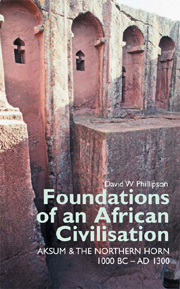18 - Epilogue: The future of the past in the northern Horn
from Part Three - AFTER AKSUM
Published online by Cambridge University Press: 05 December 2015
Summary
Writing this book has emphasised not only what we know but what we do not. In this epilogue I shall attempt to offer some guidelines that future researchers and administrators may find useful. I hope that these suggestions may be of particular interest to the increasing numbers of Ethiopian and Eritrean scholars who are embarking on careers involving the study of their countries' past and the preservation of its remains. Of course, what cannot be taken into account is the chance unanticipated discovery such as the Almaqah temple at Maqaber Ga'ewa near Wukro, described in Chapter 3. Situations such as that emphasise the need for trained, locally-based archaeologists who can undertake rescue investigations, as the Tigray Tourism and Culture Commission was fortunately able to do at Wukro. How many other important discoveries are being lost without record as the range and scale of development increases? The cost of a local archaeological service would be minute in comparison with that of the development works whose impact it could serve to mitigate – or even to exploit. In many countries, the cost of such mitigation is regarded as an integral part of the development budget, but one that has far-reaching benefits for tourism.
- Type
- Chapter
- Information
- Foundations of an African CivilisationAksum and the northern Horn, 1000 BC - AD 1300, pp. 245 - 248Publisher: Boydell & BrewerPrint publication year: 2012



